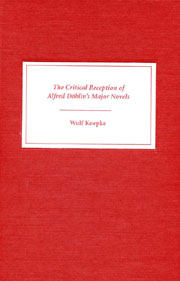Book contents
- Frontmatter
- Contents
- Preface
- Major Novels by Alfred Döblin
- Introduction
- Part One Contemporary Reviews
- Part Two Döblin Scholarship
- 3 Döblin Scholarship: The First Approaches
- 4 Die drei Sprünge des Wang-lun
- 5 Wadzeks Kampf mit der Dampfturbine
- 6 Wallenstein
- 7 Berge Meere und Giganten
- 8 Manas
- 9 Berlin Alexanderplatz
- 10 Babylonische Wandrung
- 11 Pardon wird nicht gegeben
- 12 Amazonas
- 13 November 1918
- 14 Hamlet oder Die lange Nacht nimmt ein Ende
- 15 Döblin's Impact on Other Writers
- Conclusion
- Bibliography
- Index
11 - Pardon wird nicht gegeben
from Part Two - Döblin Scholarship
Published online by Cambridge University Press: 05 February 2013
- Frontmatter
- Contents
- Preface
- Major Novels by Alfred Döblin
- Introduction
- Part One Contemporary Reviews
- Part Two Döblin Scholarship
- 3 Döblin Scholarship: The First Approaches
- 4 Die drei Sprünge des Wang-lun
- 5 Wadzeks Kampf mit der Dampfturbine
- 6 Wallenstein
- 7 Berge Meere und Giganten
- 8 Manas
- 9 Berlin Alexanderplatz
- 10 Babylonische Wandrung
- 11 Pardon wird nicht gegeben
- 12 Amazonas
- 13 November 1918
- 14 Hamlet oder Die lange Nacht nimmt ein Ende
- 15 Döblin's Impact on Other Writers
- Conclusion
- Bibliography
- Index
Summary
DÖBLIN'S FIRST NOVEL WRITTEN ENTIRELY IN EXILE — after the transitional work Babylonische Wandrung, which he began before leaving Germany in 1933 — was Pardon wird nicht gegeben, published in 1935. It is an anomaly in the author's oeuvre in that it is a well-built novel of modest length with a clear plot, fairly past-paced action, and an emphasis on psychological processes, albeit with a socio-political background. It also has easily discernable autobiographical elements. This has caused some scholars to surmise that this novel was written hurriedly between July and October 1934, under financial pressure, in order to reach the drastically shrunken audience, and was meant for swift and easy reading. But if it was an experiment in commercial writing, Döblin returned afterwards to the expansive epic forms of Amazonas and November 1918. Pardon wird nicht gegeben did indeed sell sufficiently well and had enough appeal for translations into English (Men Without Mercy), French, Italian, Russian, and Polish, all in 1937. The postwar edition of 1960 went into a second edition in 1962, followed by a dtv paperback in 1964. Evidently Döblin had offered a readable story and achieved at least a moderate commercial success, whether this was his chief goal or not.
However, with a writer like Döblin, notorious for his disdain for “easy readers,” such an explanation seems improbable, even under the pressures of exile. Robert Minder, whose review in the Revue de l'enseignement des langues vivantes stood at the beginning of his friendship with Döblin, saw an influence of the French environment and French classical forms.
- Type
- Chapter
- Information
- The Critical Reception of Alfred Döblin's Major Novels , pp. 165 - 170Publisher: Boydell & BrewerPrint publication year: 2003

